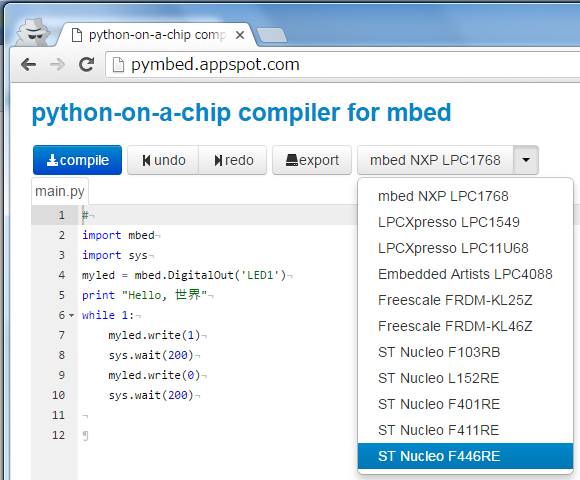python-on-a-chip online compiler
- http://pymbed.appspot.com/
- https://code.google.com/p/python-on-a-chip/
- http://www.youtube.com/watch?v=Oyqc2bFRW9I
- https://bitbucket.org/va009039/pymbed/
more info: python-on-a-chip
vm/seq.c
- Committer:
- va009039
- Date:
- 2016-04-14
- Revision:
- 15:94ca5c8003e5
- Parent:
- 0:65f1469d6bfb
File content as of revision 15:94ca5c8003e5:
/*
# This file is Copyright 2006 Dean Hall.
# This file is part of the PyMite VM.
# This file is licensed under the MIT License.
# See the LICENSE file for details.
*/
#undef __FILE_ID__
#define __FILE_ID__ 0x14
/**
* \file
* \brief Sequence
*
* Functions that operate on sequences
*/
#include "pm.h"
/*
* Compares two sequence objects
* Assumes both objects are of same type (guaranteed by obj_compare)
*/
int8_t
seq_compare(pPmObj_t pobj1, pPmObj_t pobj2)
{
int16_t l1;
int16_t l2;
pPmObj_t pa;
pPmObj_t pb;
PmReturn_t retval;
int8_t retcompare;
/* Get the lengths of supported types or return differ */
if (OBJ_GET_TYPE(pobj1) == OBJ_TYPE_TUP)
{
l1 = ((pPmTuple_t)pobj1)->length;
l2 = ((pPmTuple_t)pobj2)->length;
}
else if (OBJ_GET_TYPE(pobj1) == OBJ_TYPE_LST)
{
l1 = ((pPmList_t)pobj1)->length;
l2 = ((pPmList_t)pobj2)->length;
}
#ifdef HAVE_BYTEARRAY
else if (OBJ_GET_TYPE(pobj1) == OBJ_TYPE_BYA)
{
/* Return if the lengths differ */
l1 = ((pPmBytearray_t)pobj1)->length;
l2 = ((pPmBytearray_t)pobj2)->length;
if (l1 != l2)
{
return C_DIFFER;
}
return sli_strncmp((char const *)&(((pPmBytes_t)((pPmBytearray_t)pobj1)->val)->val),
(char const *)&(((pPmBytes_t)((pPmBytearray_t)pobj2)->val)->val),
l1)
? C_DIFFER : C_SAME;
}
#endif /* HAVE_BYTEARRAY */
else
{
return C_DIFFER;
}
/* Return if the lengths differ */
if (l1 != l2)
{
return C_DIFFER;
}
/* Compare all items in the sequences */
while (--l1 >= 0)
{
retval = seq_getSubscript(pobj1, l1, &pa);
if (retval != PM_RET_OK)
{
return C_DIFFER;
}
retval = seq_getSubscript(pobj2, l1, &pb);
if (retval != PM_RET_OK)
{
return C_DIFFER;
}
retcompare = obj_compare(pa, pb);
if (retcompare != C_SAME)
{
return retcompare;
}
}
return C_SAME;
}
/* Returns the length of the sequence */
PmReturn_t
seq_getLength(pPmObj_t pobj, uint16_t *r_index)
{
PmReturn_t retval = PM_RET_OK;
switch (OBJ_GET_TYPE(pobj))
{
case OBJ_TYPE_STR:
*r_index = ((pPmString_t)pobj)->length;
break;
case OBJ_TYPE_TUP:
*r_index = ((pPmTuple_t)pobj)->length;
break;
case OBJ_TYPE_LST:
*r_index = ((pPmList_t)pobj)->length;
break;
#ifdef HAVE_BYTEARRAY
case OBJ_TYPE_BYA:
*r_index = ((pPmBytearray_t)pobj)->length;
break;
#endif /* HAVE_BYTEARRAY */
case OBJ_TYPE_DIC:
*r_index = ((pPmDict_t)pobj)->length;
break;
default:
/* Raise TypeError, non-sequence object */
PM_RAISE(retval, PM_RET_EX_TYPE);
break;
}
return retval;
}
/* Returns the object sequence[index] */
PmReturn_t
seq_getSubscript(pPmObj_t pobj, int16_t index, pPmObj_t *r_pobj)
{
PmReturn_t retval;
pSeglist_t pkeys;
uint8_t c;
switch (OBJ_GET_TYPE(pobj))
{
case OBJ_TYPE_STR:
/* Adjust for negative index */
if (index < 0)
{
index += ((pPmString_t)pobj)->length;
}
/* Raise IndexError if index is out of bounds */
if ((index < 0) || (index > ((pPmString_t)pobj)->length))
{
PM_RAISE(retval, PM_RET_EX_INDX);
break;
}
/* Get the character from the string */
c = ((pPmString_t)pobj)->val[index];
/* Create a new string from the character */
retval = string_newFromChar(c, r_pobj);
break;
case OBJ_TYPE_TUP:
/* Get the tuple item */
retval = tuple_getItem(pobj, index, r_pobj);
break;
case OBJ_TYPE_LST:
/* Get the list item */
retval = list_getItem(pobj, index, r_pobj);
break;
#ifdef HAVE_BYTEARRAY
case OBJ_TYPE_BYA:
retval = bytearray_getItem(pobj, index, r_pobj);
break;
#endif /* HAVE_BYTEARRAY */
/* Issue #176 Add support to iterate over keys in a dict */
case OBJ_TYPE_DIC:
pkeys = ((pPmDict_t)pobj)->d_keys;
retval = seglist_getItem(pkeys, index, r_pobj);
break;
default:
/* Raise TypeError, unsubscriptable object */
PM_RAISE(retval, PM_RET_EX_TYPE);
break;
}
return retval;
}
PmReturn_t
seqiter_getNext(pPmObj_t pobj, pPmObj_t *r_pitem)
{
PmReturn_t retval;
uint16_t length;
C_ASSERT(pobj != C_NULL);
C_ASSERT(*r_pitem != C_NULL);
C_ASSERT(OBJ_GET_TYPE(pobj) == OBJ_TYPE_SQI);
/*
* Raise TypeError if sequence iterator's object is not a sequence
* otherwise, the get sequence's length
*/
retval = seq_getLength(((pPmSeqIter_t)pobj)->si_sequence, &length);
PM_RETURN_IF_ERROR(retval);
/* Raise StopIteration if at the end of the sequence */
if (((pPmSeqIter_t)pobj)->si_index == length)
{
/* Make null the pointer to the sequence */
((pPmSeqIter_t)pobj)->si_sequence = C_NULL;
PM_RAISE(retval, PM_RET_EX_STOP);
return retval;
}
/* Get the item at the current index */
retval = seq_getSubscript(((pPmSeqIter_t)pobj)->si_sequence,
((pPmSeqIter_t)pobj)->si_index, r_pitem);
/* Increment the index */
((pPmSeqIter_t)pobj)->si_index++;
return retval;
}
PmReturn_t
seqiter_new(pPmObj_t pobj, pPmObj_t *r_pobj)
{
PmReturn_t retval;
uint8_t *pchunk;
pPmSeqIter_t psi;
C_ASSERT(pobj != C_NULL);
C_ASSERT(*r_pobj != C_NULL);
/* Raise a TypeError if pobj is not a sequence */
if ((OBJ_GET_TYPE(pobj) != OBJ_TYPE_STR)
&& (OBJ_GET_TYPE(pobj) != OBJ_TYPE_TUP)
&& (OBJ_GET_TYPE(pobj) != OBJ_TYPE_LST)
&& (OBJ_GET_TYPE(pobj) != OBJ_TYPE_DIC))
{
PM_RAISE(retval, PM_RET_EX_TYPE);
return retval;
}
/* Alloc a chunk for the sequence iterator obj */
retval = heap_getChunk(sizeof(PmSeqIter_t), &pchunk);
PM_RETURN_IF_ERROR(retval);
/* Set the sequence iterator's fields */
psi = (pPmSeqIter_t)pchunk;
OBJ_SET_TYPE(psi, OBJ_TYPE_SQI);
psi->si_sequence = pobj;
psi->si_index = 0;
*r_pobj = (pPmObj_t)psi;
return retval;
}
